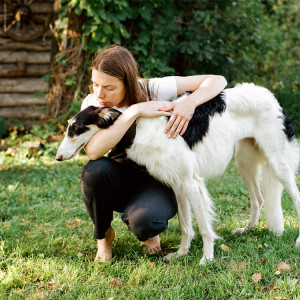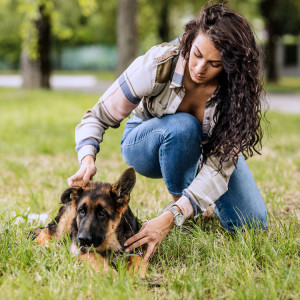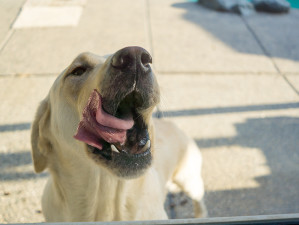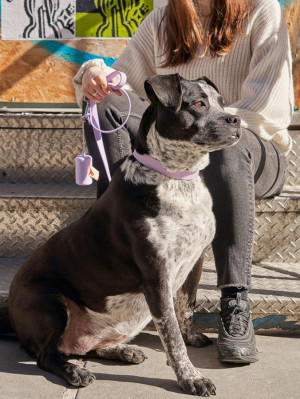What Causes Diarrhea in Dogs?
It’s a poopy problem to have.

Share Article
In This Article:
What Is Diarrhea in Dogs? Causes of Diarrhea in Dogs What Causes Bloody Diarrhea in Dogs? When to Consult a Vet
Have you ever experienced this? You’re taking a stroll with your beloved pup. You’ve got your handy poop bags ready because you’re a responsible dog parent who picks up after their pup. Your pup squats to have what you expect to be a normal, formed, pick-up-able bowel movement, but instead, they let loose a small pile of liquidy schmoo. So, you panic and think: Ugh, why me? What causes liquid diarrhea in dogs, anyway? And what the heck am I supposed to do with these poop bags?
Diarrhea in dogs is caused by excess water in the stool. Excess water can be due to extra water being excreted into the gut or not enough water being taken out before a bowel movement. Dogs can also develop diarrhea due to gut motility issues, causing stool to leave the body before enough water can be absorbed from it.
What is the most common cause of diarrhea in dogs?
Diarrhea is a very common presenting complaint in veterinary emergency and urgent care clinics. Sometimes there is an obvious cause (i.e., my dog ate rotten deli meat from the trash and now he’s got the runs), but in many cases there isn’t.

When the cause isn’t clear, many times dog diarrhea is chalked up to “gastroenteritis,” a term used to describe inflammation of the gut. The gut can become inflamed due to eating unusual food, eating spoiled food, stress, infections, and a host of other causes. Luckily, most cases of mild to moderate diarrhea in dogs respond to similar forms of supportive care.
Causes of diarrhea in dogs
The list of reasons why dogs develop diarrhea can range from short to ridiculously long, depending on how detailed you want to get. The long version includes multiple species of bacteria, each type of food allergen, and every trigger of stress. The short list is: almost everything. Nearly anything can make a dog’s poop a little loose, even if it just happens once. Here’s a medium-sized list of common causes of diarrhea on dogs:
Stress
Dogs like consistency and predictability, and they can become stressed during major changes like travel, boarding, or moving to a new home. Diarrhea associated with stress can look like softer-than-normal stool and is often self-limiting.
Diet changes
New foods and treats are a common cause of diarrhea in dogs. Any abrupt change in diet can give a dog the runs, even if switching to a high-quality diet. This is why it’s important to make any diet changes slowly and transition to a new food over the course of seven to ten days.
Dietary indiscretion
Saying a dog has had dietary indiscretion is basically a nice way of saying a dog ate garbage. When dogs eat trash or random stuff off the ground, bacteria, toxins, or irritants can cause diarrhea. Diarrhea associated with dietary indiscretion can range from a single bout of loose stool to multiple episodes of watery or bloody diarrhea.
Medications
Diarrhea can be a side effect of some medications, especially when given on an empty stomach. Antibiotics are a common culprit. Be sure to follow medication instructions and talk to your vet if your dog isn’t tolerating prescribed medications well.
Food intolerances
Food allergies and food intolerance are often confused. Food allergies are an immune response to specific proteins in a dog’s diet (for example, chicken) that typically result in skin issues. Dogs with food allergies tend to have itchy skin and are prone to ear infections.
Food intolerances, on the other hand, are not related to an immune response, but rather how well a dog’s digestive system can handle certain foods. This can include nutritious snacks if your dog’s GI tract is sensitive to them. Though uncommon, even foods that are considered “bland” can cause issues in some dogs. So, if you’re wondering, “Can pumpkin cause diarrhea in dogs?”, the answer is: for some dogs, yes.
Systemic disease
Diarrhea is a non-specific symptom, meaning it doesn’t always stem from a problem with the GI tract. Diarrhea can also be seen with systemic diseases like liver disease, kidney disease, Cushing’s disease (hypoadrenocorticism), and diabetes.
Viral infections
Parvo and distemper in dogs are both viruses known to cause bloody diarrhea. Puppies are more susceptible to these diseases, especially if they have yet to complete their series of puppy vaccines.
Bacterial infections
Bacteria like Salmonella, E.coli, and Listeria can cause food-borne illnesses that lead to watery or bloody diarrhea in dogs. Feeding a raw diet puts dogs (and their family members) at higher risk for these illnesses.
Intestinal parasites
Intestinal parasites like roundworms, hookworms, tapeworms, whipworms, Coccidia, and Giardia are known to cause diarrhea in dogs. The diarrhea caused by intestinal parasites can vary from soft tan stool to watery bloody diarrhea. Sometimes the worms help make the diagnosis easy by making an appearance in a dog’s poop.
Pancreatitis
Pancreatitis in dogs is a condition in which the pancreas, a digestive organ, becomes inflamed, leading to gastrointestinal issues and symptoms like diarrhea, vomiting, and abdominal pain. Dogs can develop pancreatitis after eating rich or fatty foods, or by being a member of a predisposed breed (looking at you, Yorkies and Schnauzers).
Foreign body obstruction
Gastrointestinal obstruction is a common consequence when dogs eat non-food items like socks and toys. These items block the passage of normal digestive material and can lead to diarrhea, vomiting, abdominal pain, and worse.
Cancer
Cancer can infiltrate intestinal walls and impact digestion and water absorption, resulting in diarrhea. It can also appear as a tumor that partially or completely obstructs the stomach or intestines.
Inflammatory bowel disease
Inflammatory bowel disease (IBD) in dogs is a condition in which dogs experience persistent inflammation of their GI tract leading to chronic diarrhea, gas, and weight loss.
Toxin ingestion
Toxins can cause damage to the stomach, intestines, or other organs, leading to non-specific signs like vomiting and diarrhea. For example, dogs can develop kidney damage from raisin or ibuprofen ingestion. Additionally, some types of rat bait can affect a dog’s ability to clot blood effectively, leading to abnormal bleeding that can show up as blood in the stool.
What causes bloody diarrhea in dogs?
I’ve seen many dog parents in a panic after witnessing their dog poop blood. And the response is understandable — bloody poop is not normal and can be alarming.
Typical runny diarrhea can progress to bloody diarrhea if there is significant inflammation in the gut. If diarrhea is bloody from the start, it could indicate bleeding somewhere in the GI tract, which might be serious.
I often try to identify possible causes of bloody diarrhea in dogs by asking: Did the diarrhea start bloody, or did it begin as typical diarrhea and then turn bloody? If your dog has bloody diarrhea, be prepared to describe the progression to your veterinarian. While this detail may not pinpoint the exact cause, it can help your vet determine what type of testing may be needed, like blood clotting tests.
Another thing to know is that blood in the stool can vary in appearance. Bright red blood often indicates bleeding in the lower GI tract, while dark, tarry stool suggests digested blood from higher up, like the stomach).
Possible causes of bloody diarrhea in dogs include:
Parvo virus
Canine distemper virus
Rat bait toxicity
Low platelet count
Acute hemorrhagic diarrhea syndrome/hemorrhagic gastroenteritis
Hookworms
Cancer
When to consult a vet
Many cases of diarrhea in dogs are mild, self-limiting, and clear up in a day or so. Many dogs with mild diarrhea can also improve with basic at-home care. Sometimes diarrhea is ongoing or severe and needs medical attention.
If left untreated, diarrhea in dogs causes dehydration, which makes dogs feel crummy. Dehydration can progress to hypovolemia, a condition in which the body loses too much water and circulation is affected. This commonly occurs with acute hemorrhagic diarrhea syndrome, also referred to as hemorrhagic gastroenteritis (HGE).
Because dog diarrhea causes and symptoms can vary, dog parents should not hesitate to contact their vet if their dog’s diarrhea is progressing or if their dog seems unwell.
Symptoms that should prompt you to reach out to a vet include:
Bloody diarrhea (red or dark)
Known toxin ingestion
Vomiting
Lethargy
Weakness
Multiple bouts of large volumes of diarrhea
Pain
Decreased or absent appetite
References
Center for Veterinary Medicine. “Raw Pet Food Diets Can Be Dangerous to You and Your Pet.” U.S. Food and Drug Administration, 2019, www.fda.gov/animal-veterinary/animal-health-literacy/get-facts-raw-pet-food-diets-can-be-dangerous-you-and-your-petopens in new tab.
Marks, Stanley L. “Diarrhea.” Canine and Feline Gastroenterology, 2013, pp. 99–108, https://doi.org/10.1016/b978-1-4160-3661-6.00011-0opens in new tab.

Dr. Alycia Washington, DVM, MS
Alycia Washington is a small-animal emergency veterinarian with over 10 years of experience based in North Carolina. She works as a relief veterinarianopens in new tab and provides services to numerous emergency and specialty hospitals. She also works as a veterinary writer with a focus on educating pet parents.
Related articles
![A black dog with a tilted head looks attentively at the camera while sitting in grass.]()
Is My Dog’s Poop Normal?
From bloody poop to diarrhea—all your dog’s poop problems explained.
What Causes Mucus in Dog Poop?
![Young woman comforting German Shepherd puppy outside.]()
My Dog Is Pooping Blood: What Should I Do?
It’s an alarming sight, but here’s what you should know.
![Labrador retriever licking their lips]()
Why Do Dogs Eat Poop?
What to do when your dog has questionable tastes.
![A woman digging a big hole in her flower bed]()
How to Compost Your Pet’s Poop
Without getting totally grossed out.
![Dog sitting on ground with owner on steps holding leash]()
8 Dog Poop Bags That Won’t Crap Out On You
Because they aren’t all made the same.








